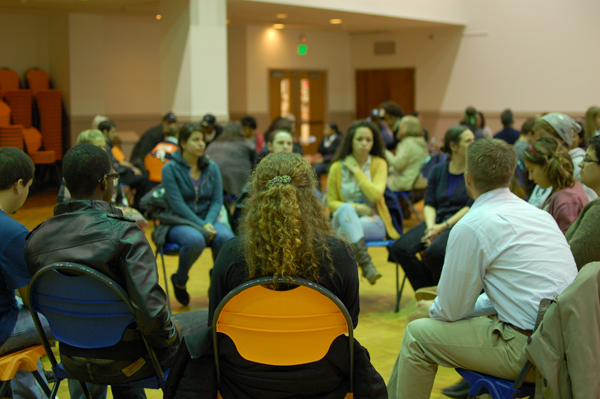

Student leaders and administrative officials at SUNY New Paltz are hatching ideas to host more fora similar to the one conducted in the fall semester following the offensive racial postings — this time uniting behind the theme of campus safety.
“We don’t want to have a situation to develop where we have different interest groups competing with one another over these types of concerns,” President Donald Christian said. “So if we start thinking about a unifying factor, what unifies all the different groups that are targets of bias or inequity on a college campus? Many boil down to safety.”
Christian and Student Association (SA) President Terrell Coakley met before spring break to discuss hosting another forum slated for early April. It would deal with “uniting safety concerns” among different identity groups on campus.
“[The idea] to keep this as a continued thing,” Coakley said. “[We have the] ability to change things, and make a point to try and talk to one another.”
Christian said he hopes the forum addresses incidents of sexual assault, the lack of safety gay and lesbian students face and harassment concerns that some international adjunct faculty have expressed. He said he also wanted the recent death of Trayvon Martin, a black, unarmed teenager in Florida, to highlight any lingering anxieties about safety and be turned into a productive discussion.
Meanwhile, Coakley said the goal of the safety forum is to “cultivate a better sense of community.” He said in times of crisis, administrators must be held accountable, but he said the point would not be to chastise them.
“We all go to forums together, come with solutions instead of screaming,” Coakley said.
Coakley said the idea for safety was prompted by two recent incidents.
He said a few members of the campus community who identify as gay and transgender encountered slurs while walking through town. Another incident that involved a sexual assault will gauge women’s concerns about walking around at night and their well being.
Coakley said the idea of “Ableism,” a form of discrimination against people with disabilities and limited mobility, will be discussed. He said he wants to make sure the campus is accessible for everyone.
With construction and how some areas are blocked off, like the area around Hasbrouck, this is forcing students to go “all the way around and across the bridge.” He said these areas are being ignored in terms of safety and accessibility.
Coakley said with events like Pause (No Homo) and the resident-hall organized TRANSaction, SA offered its support instead of sponsorship, choosing to focus on coordinating its own forum about campus safety. He said SA collaborated with TRANSaction on things like food reimbursements and graphic design needs.Coakley called Pause (No Homo) a “good, preliminary program” on gender and homophobic issues.
Still, Coakley said he wants the fora to draw a sizable portion of the student body so a sensible solution can be achieved. He said a current debate is the one about the smoking policy.
“People don’t attack smoking, they attack smokers,” Coakley said.
He said if you offend one, you will offend them all.
Christian called the TRANSaction event “remarkable” and said it’s important to continue this student-generated and student-lead momentum for future fora.
Coakley said of last semester’s race forum, “Can We Talk About It?,” that most in attendance “were like-minded people.” He said some got a “little glimpse” into the concept of white privilege.
Second-year human services major Carolyn Byrd attended the forum last fall. She said it was useful in uniting the community against hatred.
“The point of the forum was to open up a dialogue about race and encourage people to have the difficult conversations that many times people shy away from,” she said. “I feel that everyone in attendance walked away with a realization that the entire campus, regardless of ethnicity, was affected by the incidents and therefore needed to stand in solidarity against such hatred.”
The administration and SA are vying for a $10,000 grant from SUNY Central which would go toward a series of discussions, similar to the proposed safety forum, focusing on the campus climate. Christian feels public universities and colleges are ripe places to educate people on these issues.
“So even if a college campus had a perfect climate, we would still be on fertile ground to educate,” Christian said.
